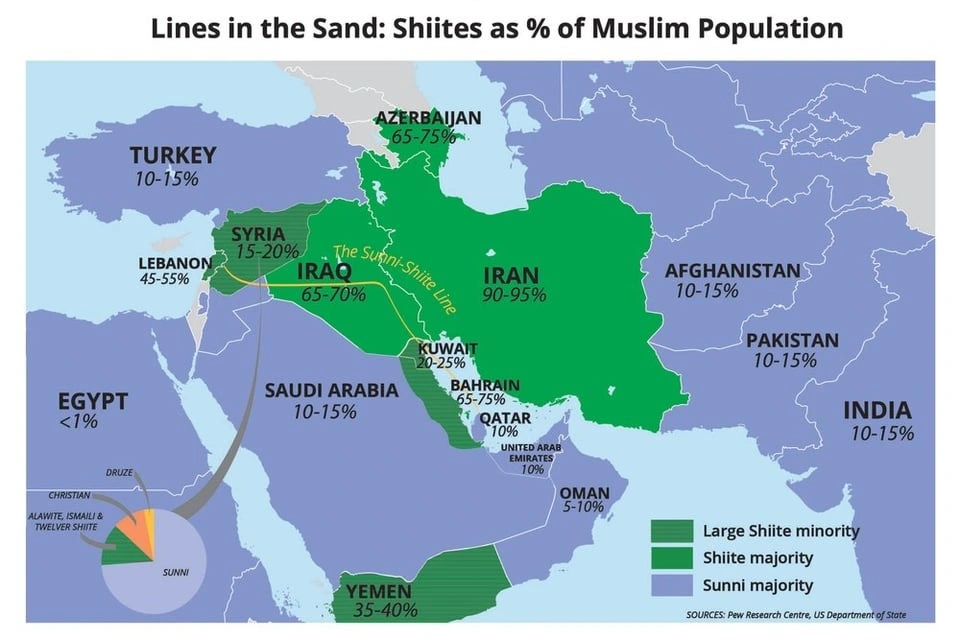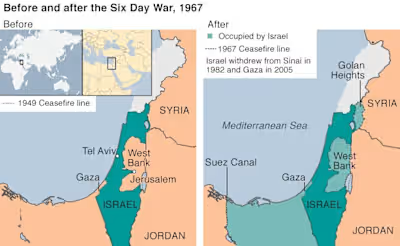Israel-Hamas War
Israel Palestine conflict: Geopolitical implications
After the October 7th HAMAS attacks on Israeli civilians, the world has reacted with understandably emotional responses to what was a heinous loss of life at the hands of sectarian terrorism. Of course, the Israel Palestine conflict cannot be accurately discussed through a purely geopolitical framework. This conflict is unique in the current geopolitical context as its roots go much deeper than geopolitics. It is a conflict which is inextricably linked to sectarian dispute as Israel and Palestine constitute an area of the globe that has religious significance for each of the three Abrahamic religions, Christianity, Judaism, and Islam.
Thanks for reading Devin’s Substack! Subscribe for free to receive new posts and support my work.
Although this issue transcends any binary classification, it is fair to say that generally the Arab nations of the Middle East support either morally or through practical means such as funding and artillery supplies, the Palestinian efforts to establish their own state. Conversely the United States has long supported Israel through similar means in their pursuit of control over the Gaza strip and the West Bank, with the U.S. signing a new deal before this recent Hamas attack, to provide Israel with $38 billion in military assistance over the next decade.
Netanyahu’s Israel
The US has supported Israel under the auspices that they are the singular example of Democracy in the Middle East surrounded by destabilized states run by dictators and religious militant groups. In reality this is not entirely accurate. Many Israeli journalists recognise this, with some such as Yossi Klein Halevi, who served in the Israeli Defence Forces (IDF) patrolling the Gaza strip in 1982, and who has covered Israeli politics for over 30 years ,saying “the Netanyahu government is the most politically extreme, the most morally corrupt, and the most contemptuous of good governance in Israel’s history”.
Other longtime experts on Israel-Palestine relations such as the great Professor Norm Finklestein, or Dr. Benny Morris are essential points of contact for all those interested in the historical context of the conflict. They too are critics of the Netanyahu regime and also see a gradual shift in demography, where many conservative and ultra-orthodox populations in Israel such as the Haredim have had more children than secular Israeli liberals over the past 20-30 years (a common theme in demographics), as responsible for the rightward ideological shift of the nation’s populous.
The Netanyahu government has erased any semblance of hope that liberal Israelis have had for a compromise to the conflict, a conflict which has already bestowed upon them the difficult task of learning “to live with the tragedy of ruling over the Palestinian people” as Halevi put it.
Netanyahu’s regime has moved the country’s politics to the far right, through collaboration and coalition with ultra-nationalist factions, constituting a particularly extreme era of Zionism. His regime has tried to overhaul Israeli institutions by proposing legislation to weaken the Supreme Court’s capabilities and consolidate power in Parliament, an entirely undemocratic approach which sparked mass protests in Israel earlier this year.
Much of this shift has come after Netanyahu himself was tried in 2021 for various indictments related to corruption, including bribery and breach of trust. Moreover, Netanyahu’s repudiation of Democratic norms and unwillingness to reconcile with Palestinian authority is well documented. This was made particularly clear in a video from 2001, which surfaced a decade later, showing Netanyahu discussing Israeli strikes against Palestinians, his unambiguous intent to undermine the Oslo Accords, and his ability to manipulate the United States into continued support for Israel, all of which exacerbated tensions between him and then President Barrack Obama.
The current ideological shift in Israel spearheaded by the Netanyahu regime has left Palestine in a more precarious situation than ever before. None of these criticisms of Israel’s politics should be misconstrued as support for Hamas. Hamas is a terrorist organization that has routinely murdered civilians and should not be considered a viable negotiation partner. In fact, apart from Netanyahu’s lack of reconciliatory efforts, it is the fact that there has not been a “credible Palestinian peace partner” to engage with in Gaza that peace talks so rarely bear any fruit.
Hamas won the 2006 democratic election in Palestine over the more moderate secular party Fatah, leading to the unethical blockade of Gaza beginning in 2007. Unfortunately, even though the deprivation of food, water and electricity to Gazans is recognized as a from of apartheid by Human rights groups such as Amnesty International, and by most Western liberals, it is the fact that Hamas controls Gaza, politically and militaristically, that makes negotiations so difficult for Palestinians.
A kind of self-fulfilling prophecy has been taking place particularly since the blockade began, in which the subjugation of Gazans by Israel has led to a collective hopelessness and a power vacuum in the impoverished region. This power vacuum has been filled by radicalized terrorist organizations such as Hamas and its numerous affiliates in Gaza. This proliferation of terrorism and Jihad, in addition to Israel’s expansionist policies, has culminated in consistent escalations in kinetic warfare between Hamas and Israel constituting a vicious cycle that provokes young Gazan citizens to join these militant groups out of desperation, which encourages a stronger response from Israel, and so on and so forth.
If you believe in the philosophy of Humanism, or simply are an advocate of peace over war, then the idea that Hamas has the right to commit acts of terrorism due to the abhorrent treatment of Gazans by Israelis has never been and never will be a morally coherent argument. For this reason, radical political groups or individuals that support the Hamas attacks on Israel should be condemned. Similarly, the idea that Israel has the right to steal territory through settlements in the West Bank, and to deprive over 2 million people in Gaza of basic human necessities because Hamas controls the region, is also a morally incoherent argument that should not be accepted.
For this reason, laws banning Pro-Palestine protests such as the one passed in France last week, set an inauspicious precedent for Free Speech and Censorship in Europe and the West. This is a highly moralized event and to ban speech from groups that you disagree with, even if you genuinely feel like their rhetoric is “dangerous” or “misinformation” defeats the purpose of having free speech laws, and of having any viable means of dissent against government policy. Regardless of which side you come down on with this conflict, the idea that as of today in France, you can have a Pro-Israel demonstration that calls for the destruction of Gaza, but a Pro-Palestine demonstration is illegal, should seem antithetical to democratic norms, because it is.
It seems that after these recent events, diplomatic peace talks between Hamas and Israel are most likely not possible for several years, perhaps decades. As reconciliation between Palestinians and Israelis seems far off, the primary concern of every nation should not be to throw support behind one side or the other, even though Europe and the U.S. have already declared clear support for Israel in their invasion of Gaza. Any diplomats that desire peace should be seeking de-escalation, not bifurcation of the moral landscape which typically leads to dehumanizing rhetoric and othering of the enemy. Unfortunately, the discourse seems to already being heading this way, where depending on your location, the media has either framed Hamas and Gaza as a barbaric state or Israel as precipitating genocide, none of which contributes to a discourse of peace and reconciliation.
Geopolitical implications for the Middle East and the West
The gravest concern for nations on the outside looking in, is this conflict turning into a proxy war between the U.S. and Iran. One thing for certain is that the normalization talks between Israel and Saudi Arabia, two nations at the heart of this ancient Arab-Israeli conflict, have been put on ice. Given that Saudi Arabia and Israel have similar economic and security ties to the U.S., this agreement would have aligned these nations in terms of security operations.
U.S. – Iran tensions begin to rise as Iran cozies up to China and Russia. Saudi Arabia- Iran tensions have also heated up recently, underlined by the eternal Sunni- Shia rivalry and Iran’s Houthi proxy war in Yemen. The West was therefore in a unique position in which they were soon to have the richest and most powerful Arab nation (Saudi Arabia) join their side, giving them a monumental geopolitical win in the region and perhaps setting up a gradual dismantling of Iranian-Shia influence in the Levant. By the way, we must not forget that this Iranian-Shia influence in the region was amplified due to the U.S. idiotic and calamitous invasion of Iraq, giving Iran a clean route to diffuse Shia control all the way from Iran, through Iraq, Syria, and into Lebanon to support their subsidiary Hezbollah.

Nonetheless, if the Saudi-Israeli normalization agreement had been finalized, Iran would now have their Saudi rivals actively aligned with their biggest geopolitical enemies, the U.S. and Israel.
For these reasons, we must be wary of the timing that the Hamas attacks took place. Its either an almighty stroke of good luck and coincidence for Iran, or a brutal, yet successful last-minute effort to drive a wedge back between the Saudis and the West along sectarian and ethnic lines. Regardless, Iran will surely capitalize on the current situation and perhaps even look to do China and Russia’s bidding. By prolonging this Israel-Hamas war through whatever support means they see fit, they can draw America into another proxy war, resulting in the U.S. overextending themselves militaristically with trillions of dollars being sunk into a proxy war in Ukraine and the Middle East. This overextension militaristically is often the precursor to the fall of great empires, and if America didn’t have so much economic interests in weapons manufacturing and war, they should be shrewd enough to see that any ‘pro-Israel involvement’' in Gaza has the potential to be a strategic blunder which could jeopardize the nations stability and security like never before.
Thanks for reading Devin’s Substack! Subscribe for free to receive new posts and support my work.
Like this project
Posted Nov 17, 2023
Geopolitical implications
Likes
0
Views
13




